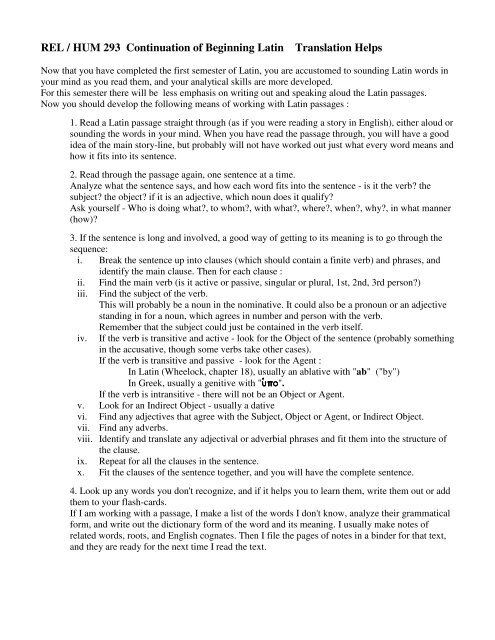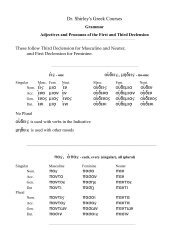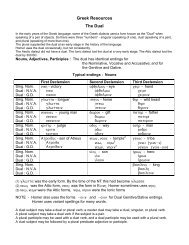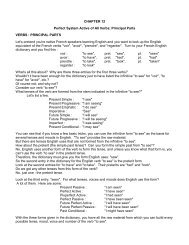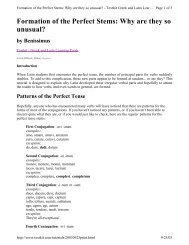How to Translate a Sentence - Dr. Shirley's Site
How to Translate a Sentence - Dr. Shirley's Site
How to Translate a Sentence - Dr. Shirley's Site
Create successful ePaper yourself
Turn your PDF publications into a flip-book with our unique Google optimized e-Paper software.
REL / HUM 293 Continuation of Beginning Latin Translation Helps<br />
Now that you have completed the first semester of Latin, you are accus<strong>to</strong>med <strong>to</strong> sounding Latin words in<br />
your mind as you read them, and your analytical skills are more developed.<br />
For this semester there will be less emphasis on writing out and speaking aloud the Latin passages.<br />
Now you should develop the following means of working with Latin passages :<br />
1. Read a Latin passage straight through (as if you were reading a s<strong>to</strong>ry in English), either aloud or<br />
sounding the words in your mind. When you have read the passage through, you will have a good<br />
idea of the main s<strong>to</strong>ry-line, but probably will not have worked out just what every word means and<br />
how it fits in<strong>to</strong> its sentence.<br />
2. Read through the passage again, one sentence at a time.<br />
Analyze what the sentence says, and how each word fits in<strong>to</strong> the sentence - is it the verb? the<br />
subject? the object? if it is an adjective, which noun does it qualify?<br />
Ask yourself - Who is doing what?, <strong>to</strong> whom?, with what?, where?, when?, why?, in what manner<br />
(how)?<br />
3. If the sentence is long and involved, a good way of getting <strong>to</strong> its meaning is <strong>to</strong> go through the<br />
sequence:<br />
i. Break the sentence up in<strong>to</strong> clauses (which should contain a finite verb) and phrases, and<br />
identify the main clause. Then for each clause :<br />
ii.<br />
iii.<br />
iv.<br />
Find the main verb (is it active or passive, singular or plural, 1st, 2nd, 3rd person?)<br />
Find the subject of the verb.<br />
This will probably be a noun in the nominative. It could also be a pronoun or an adjective<br />
standing in for a noun, which agrees in number and person with the verb.<br />
Remember that the subject could just be contained in the verb itself.<br />
If the verb is transitive and active - look for the Object of the sentence (probably something<br />
in the accusative, though some verbs take other cases).<br />
If the verb is transitive and passive - look for the Agent :<br />
In Latin (Wheelock, chapter 18), usually an ablative with "ab" ("by")<br />
In Greek, usually a genitive with "u(po<br />
u(po".<br />
If the verb is intransitive - there will not be an Object or Agent.<br />
v. Look for an Indirect Object - usually a dative<br />
vi. Find any adjectives that agree with the Subject, Object or Agent, or Indirect Object.<br />
vii. Find any adverbs.<br />
viii. Identify and translate any adjectival or adverbial phrases and fit them in<strong>to</strong> the structure of<br />
the clause.<br />
ix. Repeat for all the clauses in the sentence.<br />
x. Fit the clauses of the sentence <strong>to</strong>gether, and you will have the complete sentence.<br />
4. Look up any words you don't recognize, and if it helps you <strong>to</strong> learn them, write them out or add<br />
them <strong>to</strong> your flash-cards.<br />
If I am working with a passage, I make a list of the words I don't know, analyze their grammatical<br />
form, and write out the dictionary form of the word and its meaning. I usually make notes of<br />
related words, roots, and English cognates. Then I file the pages of notes in a binder for that text,<br />
and they are ready for the next time I read the text.
Example : Hebrews, chapter 1, verses 1-4<br />
This sentence is quite complicated - you will not have <strong>to</strong> deal with this degree of<br />
complexity until the 400-level language courses. I am using it as an example <strong>to</strong> show how<br />
even long and complex sentences can be analyzed and translated.<br />
English :<br />
God, who at sundry times and in diverse manners spake in times past un<strong>to</strong> the fathers by<br />
the prophets, hath in these last days spoken un<strong>to</strong> us by his Son, whom he hath appointed<br />
heir of all things, by whom also he made the worlds; who being the brightness of his glory,<br />
and the express image of his person, and upholding all things by the word of his power,<br />
when he had by himself purged our sins, sat down on the right hand of the Majesty on<br />
high; being made so much better than the angels, as he hath by inheritance obtained a more<br />
excellent name than they.<br />
Greek :<br />
Polumerwj kai polutropwj palai o( Qeoj lalhsaj <strong>to</strong>ij patrasin e0n<br />
<strong>to</strong>ij profhtaij e0p' e0sxa<strong>to</strong>u twn h(merwn <strong>to</strong>utwn e)lalhsen h(min e0n ui(w|,<br />
o(n e0qhken klhronomon pantwn, di' ou( kai e)poihsen <strong>to</strong>uj ai)wnaj: o(j w)n<br />
a)paugasma thj dochj kai xarakthr thj u(postasewj au)<strong>to</strong>u, ferwn te<br />
ta panta tw| r(hmati thj dunamewj au)<strong>to</strong>u, kaqarismon twn a(martiwn<br />
poihsamenoj e0kaqisen e0n decia| thj megalwsunhj e0n u(yhloij, <strong>to</strong>soutw|<br />
kreittwn genomenoj twn a)ngellwn o(sw| diaforwteron par' au)<strong>to</strong>uj<br />
keklhronomhken o)noma.<br />
Latin :<br />
Multifariam, multisque modis olim Deus loquens patribus in prophetis: novissime, diebus<br />
istis locutus est nobis in Filio, quem constituit haeredem universorum, per quem fecit et<br />
saecula; qui cum sit splendor gloriae, et figura substantiae eius, portansque omnia verbo<br />
virtutis suae, purgationem pecca<strong>to</strong>rum faciens, sedet ad dexteram maiestatis in excelsis:<br />
tan<strong>to</strong> melior angelis effectus, quan<strong>to</strong> differentius prae illis nomen haereditavit.<br />
i. Clauses : look for relative pronouns <strong>to</strong> help find clauses :<br />
"who . . . prophets" (The Greek and Latin passages use an Aorist or Past participle ("having<br />
spoken") instead of a Relative Pronoun - English uses a Relative Pronoun, "who", - "who" is the<br />
nominative, so is describing the Subject of the sentence)<br />
"whom . . . things" "o(n . . . pantwn", "quem . . . universorum" - the Relative Pronoun is in<br />
the accusative, so this phrase is describing the Object of the sentence.<br />
"by whom . . . worlds" " di' ou( . . .<strong>to</strong>uj ai)wnaj" "per quem . . . saecula; - the Relative<br />
Pronoun is qualified by a preposition indicating "the agent by which someone did something"<br />
"who . . .sat down . . on high" "o(j . .e0kaqisen . .e0n u(yhloij" " qui . . sedet . . in excelsis:"<br />
A long clause, containing a subsidiary clause and several subsidiary phrases, describing "Son"<br />
"being made so much better than the angels" "<strong>to</strong>soutw| kreittwn genomenoj twn a)ngellwn:"<br />
" tan<strong>to</strong> melior angelis effectus" - this is a phrase rather than a clause (no finite verb) containing a
participle (being made, genomenoj, effectus). When the main structure of the sentence has been<br />
worked out, it will be easier find which noun this phrase describes. The masculine singular<br />
nominative endings of genomenoj and "effectus" tell us <strong>to</strong> look for a masculine singular noun.<br />
"as he hath . . than they" "o(sw| . . keklhronomhken o)noma" "quan<strong>to</strong> differentius prae illis<br />
nomen haereditavit" - "as" " o(sw|" and "quan<strong>to</strong>" indicate that this is a subsidiary clause. When<br />
the main structure of the sentence has been worked out we will be able <strong>to</strong> fit this clause <strong>to</strong> the<br />
correct noun. The verb in the clause is 3rd person singular, so we will need <strong>to</strong> fit it <strong>to</strong> a singular<br />
noun or pronoun.<br />
Putting the subsidiary clauses aside, we are left with the main statement of the sentence :<br />
"God . . hath in these last days spoken un<strong>to</strong> us by his Son"<br />
"o( Qeoj . . e0p' e0sxa<strong>to</strong>u twn h(merwn <strong>to</strong>utwn e)lalhsen h(min e0n ui(w|"<br />
"Deus . . novissime, diebus istis locutus est nobis in Filio"<br />
Even if one cannot translate any more of the sentence, one has its main idea.<br />
ii. To go further with this clause (or any clause) - look for the verb.<br />
"hath spoken" "e)lalhsen<br />
e)lalhsen" "locutus est" :<br />
Third person singular active (and the Latin tells us "masculine")<br />
"<strong>to</strong> speak" can be either transitive eg. "he speaks good words" or intransitive eg. "he<br />
speaks", and it can have an Indirect Object eg. "he speaks <strong>to</strong> the crowd"<br />
iii. Look for the Subject - this is easy in all the languages - "God", "Deus", "Qeoj"<br />
Greek even uses "o(" with "Qeoj" - this is one of the easiest ways of finding the Subject in Greek.<br />
Now we have "God has spoken"<br />
iv. None of the words is in the accusative, so we probably do not have a Direct Object.<br />
v. There is an Indirect Object (dative)<br />
"un<strong>to</strong> us" "h(min" "nobis"<br />
Now we have "God has spoken <strong>to</strong> us"<br />
vi. There are no adjectives <strong>to</strong> fit with the Subject or Indirect Object<br />
vii. Adverbs <strong>to</strong> describe the verb - Latin uses "novissime" (lastly, at the end, in the last place).<br />
English and Greek use an adverbial phrase (see viii.)<br />
viii. Adverbial phrases :<br />
"Time when" -<br />
"in these last days"<br />
"e0p' e0sxa<strong>to</strong>u twn h(merwn <strong>to</strong>utwn" (at the end of these days)<br />
"novissime, diebus istis" (lastly / in the last place / at the last time, in these days)<br />
and "Means by which" -<br />
"by His Son" "e0n ui(w|" "in Filio"<br />
English adds "his" <strong>to</strong> describe "Son", but neither Latin nor Greek do this.<br />
ix. One can now work through the other clauses in a similar manner, until the whole sentence is<br />
translated. Even if the other clauses do not "fall in<strong>to</strong> place", we still have the main statement.<br />
This sentence is an example of how Paul and other writers might get carried away by the thought of Jesus,<br />
and add a string of phrases and clauses expressing thanks and glory.<br />
Copyright © 2009 Shirley J. Rollinson All Rights Reserved


